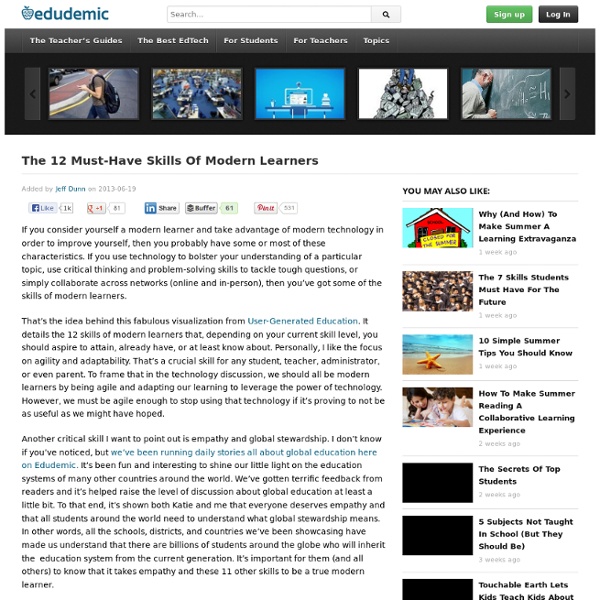



http://www.edudemic.com/2013/06/the-12-must-have-skills-of-modern-learners/
Related: 21st century teaching and learningReport highlights 10 trends set to shake up education Massive open social learning and dynamic assessment on the Open University’s list The Open University has published the Innovating Pedagogy 2014 report, which explores new forms of teaching, learning and assessment. It proposes 10 innovations that, although already established to some extent, have not yet had what it describes as “a profound influence” on education. To produce the report, academics at the university’s Institute of Educational Technology proposed a long list of new educational terms, theories and practices, which were then boiled down to 10 that it deems to “have the potential to provoke major shifts in educational practice”. 1. Massive open social learning
The five most powerful ways teachers aren’t using Google Drive (yet) Google Drive—formerly named Google Docs—is Google’s online productivity suite. It’s long been a popular choice for collaborative writing and editing of documents, especially among teachers and students, so I won’t dwell on the excellent collaboration features others have written about at length for years. More recently, Google added cloud storage space similar to what Dropbox offers. If you use any of Google’s products like Gmail or Calendar, you already have access to at least 15 GB of file storage space on Google Drive. This new addition dramatically changes the ways in which you can interact with Google Drive. Google launches new features and add-ins all the time, so if you’re still interacting with Google Drive exactly the same way you did in 2010 in the early Google Docs days, you’re in for a pleasant surprise.
DIY U: Getting Started With Self Learning Week 1: Write your personal learning plan and post it here. Steps to Creating a Personal Learning Plan 1. Goal. Pick your path. The Persistent Appeal of Technology in Learning Image credit: iStockphoto Dr. Victor Frankenstein loved technology, and Mary Shelley's work of fiction was at once a cautionary and promotional tale of technology's incredible potential. In the iconic story, he took the pieces of a human being and stitched them together to create something monstrous -- but in many ways more human than the model he was hoping to produce.
Visitors and Residents: What Motivates Engagement with the Digital Information Environment? Building on research of individuals’ modes of engagement with the web (Visitors and Residents4), and the JISC-funded Digital Information Seeker report5, this project is exploring what motivates different types of engagement with the digital environment for learning. The investigation focuses on the sources learners turn to in order to gather information, and which ‘spaces’ (on and offline) they choose to interact in as part of the learning process. It is using the Visitors and Residents6 framework to map learner’s modes of engagement in both personal and institutional contexts. The project is assessing whether individual’s approaches shift according to the learners’ educational stage or whether they develop practices/literacies in early stages that remain largely unchanged as they progress through their educational career.
tpsi21 / TopTechTools Top Tech Tools | Mobile Resources | Teacher Toolbox | The Inquiry Process TPSI21 Home This section of the TPSI21 wiki will be used to explore various technology tools that can be integrated into teaching and learning with primary sources. All of the tools are Web-based and free for educators to use. RenzulliLearning The Renzulli Learning Personal Success Plan® (PSP®) is a research-based*, goal-oriented assessment and treatment tool designed to encourage students to think, dream, and succeed. It provides proven instructional strategies that raise achievement values in test scores, grades, and attendance. The PSP helps students to identify their interests, understand how to develop these interests into talents, associate themselves with role models, and — ultimately — create meaningful, attainable goals and plans. By supporting students’ individual social and academic goals, The Personal Success Plan gives them the incentive and ambition to succeed. Students are introduced to a variety of careers and project ideas — both traditional and unique — that match their own interests and expression styles Each student’s interests, heroes and helpers, and career ideas help guide the establishment of plans and goals, which he or she starts to attain by developing appropriate projects.
How To Become More Unstoppable Every Day Karen X. Cheng is unstoppable. Three years ago, she wanted to work for Microsoft Excel, so she put 100 hours into prepping for the interview--a tactic she's tried elsewhere and failed with. Why disruptive innovation matters to education There is a common tendency at this time of year to reflect and refocus on what matters most and then use that renewed focus to chart into the year ahead. In that spirit of reflection, I want to share some thoughts on why the theory of disruptive innovation, which guides our work here at the Clayton Christensen Institute, is so important to education. If you are not familiar with the theory of disruptive innovation, a brief explanation is available here on our website.
CSMP - California International Studies Project The California International Studies Project (CISP) is a statewide network that connects universities, schools, and districts in collaborative efforts to increase K-12 teacher competence in history and international studies. It is the mission of the California International Studies Project to prepare students to work, live and be informed, active citizens in a world where conditions, peoples, and distant events may have a critical impact on their lives and those of others. Through teacher development and K-12 student experience, the project seeks to improve historical and contemporary knowledge of 21st Century realities that are fundamentally altering the international landscape and domestic affairs. Current CISP Advisory Board Members California State University: Dr.